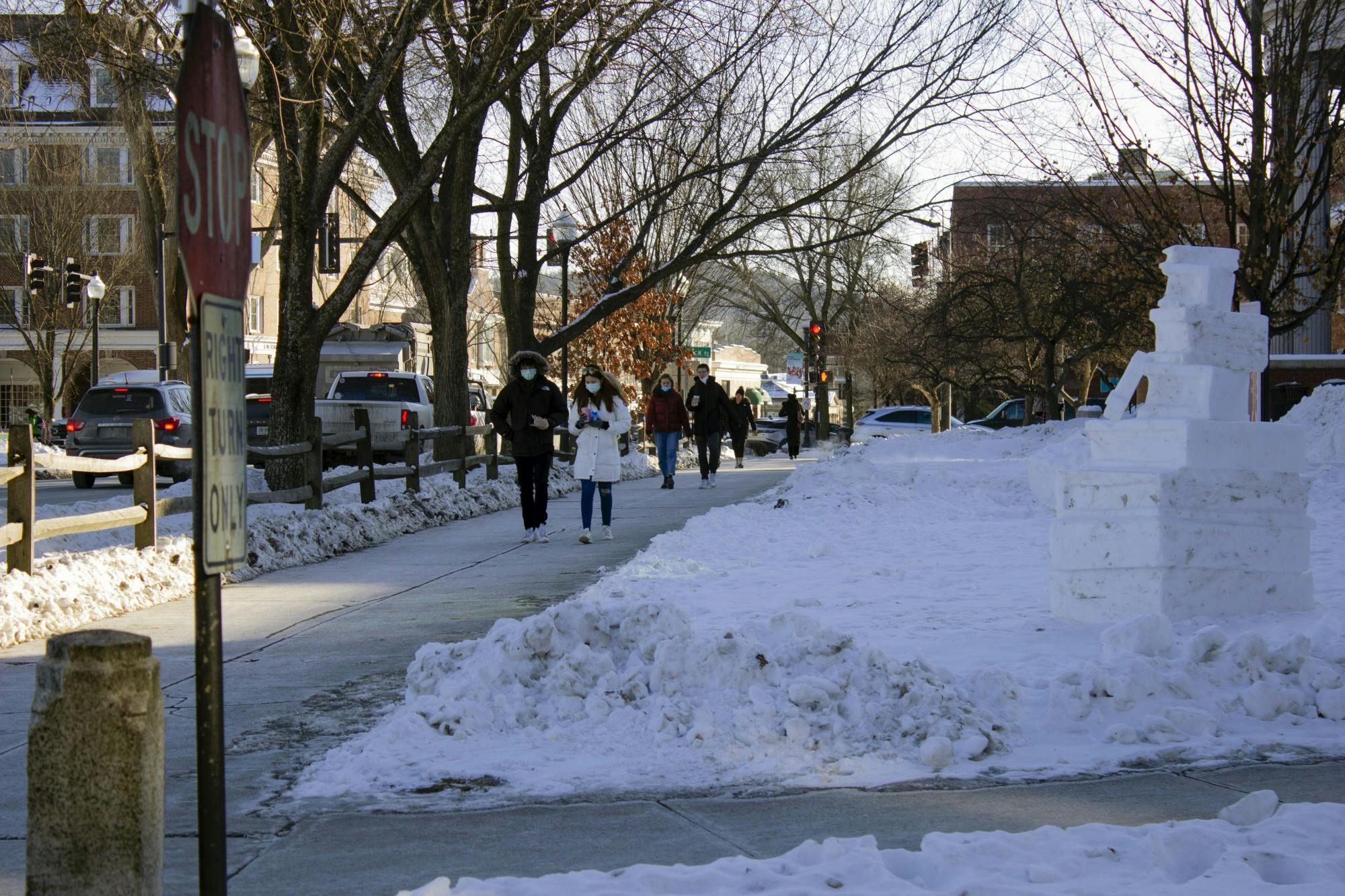As COVID-19 cases remain elevated compared to previous terms, students report struggling to keep up in classes while in isolation as well as challenges related to the lack of a universal hybrid option.
Since the start of the winter term, active cases of COVID-19 have surged due to the omicron variant — reaching a record high on Jan. 21 at 783 cases, according to the COVID-19 dashboard. It has since fallen to 146 as of Feb. 7. Over a quarter of the total student body has contracted the virus this term, The Dartmouth reported last week.
Grace Goodwin ’23 said she tested positive for COVID-19 during week two of the term and remained in isolation for seven days. She said she was able to join two of her classes over Zoom, but because her third class did not offer a Zoom option, she had to miss it entirely.
“I definitely felt like when I got out of isolation, I was behind in my classes,” Goodwin said.
She added that while she had COVID-19, she felt exhausted. Between that and the need to stay in her room, it was difficult to be productive.
Goodwin said that it was more difficult to keep up with work for the class she couldn’t attend over Zoom because of missed lectures and discussions in class. However, she noted the difficulties associated with a hybrid course model, acknowledging that it can be hard for professors to adapt to teaching their course both online and in-person.
“I do think that it’s hard when you have older professors, or professors who don’t like the Zoom thing, or who don’t really know how to do it,” Goodwin said.“To mandate hybrid courses to be an option [for students with COVID-19], or to have [professors] be prepared for that is really hard.”
Jenna Martin ’24 said she also missed out on material from in-class discussions after testing positive for COVID-19 on Jan. 25 and isolating for five days. While she was able to join all of her classes over Zoom, one of her professors had the computer facing away from him during class, so even when she would raise her hand to participate in class discussions, no one could see her.
Martin added that she does not think she rested nearly as much as she should have while she was recovering from the virus, and is still dealing with a lingering headache even after testing negative.
“I was able to stay on top of everything at the expense of feeling better,” Martin said.
Both Martin and Goodwin said the lack of a mandated hybrid course model puts students in a difficult position, as it makes it extremely difficult not to fall behind in classes.
Goodwin said that this “adds stress to the already stressful experience” of having COVID-19.
“All of these students are paying for these classes, and I think that there should be a policy that requires professors to allow students to Zoom in or watch a recorded lecture,” Martin said.
Elizabeth Hadley ’23 said she tested positive for COVID-19 on Jan. 22 and remained in isolation for the full 10 day period. Although one of her professors recorded the lectures, she felt too sick to attend class over Zoom for the majority of her isolation, she said.
“My one [professor] was able to record the Zoom class, which was very nice, so I was able to watch the lecture classes that I missed, which was really good.”
According to Hadley, the lack of a hybrid course model is “not great” because she thinks professors vary in their willingness to accommodate students who are isolating with COVID-19.
“I definitely fell behind,” she said, adding, “my [professors] were very understanding, so I was just getting extensions and doing what I can here and there.”
Olivia Sasse ’25 said that she believes the current in-person mode of instruction is “not working out perfectly,” adding that “people are being left behind or left to fend for themselves” in their courses.
Sasse said she contracted COVID-19 two weeks ago and isolated for five days. During that time, Sasse said one of her classes was fully remote, but she “completely missed” her other two classes, which did not have Zoom options.
“One of them, it’s not really a class where recording the lectures makes sense — it’s not a lecture-based class, it’s really interactive — so I just completely missed that one. I just did the homework and tried to get updates from my friends in the class,” she said.
For the third class, she added, she simply relied on the slides and the course’s textbook.
Sasse said that though she did not fall behind in her courses, she felt “majorly unmotivated” when it came to doing homework during her isolation period.
Sarah Williams ’25, who said she was on day six of her isolation when interviewed on Jan. 31, explained that she has also been struggling with a lack of motivation in her classes since testing positive for COVID-19 on Jan. 26.
Williams said keeping up with and completing her work has become “10 times harder” and that she believes she has not gotten as much out of her courses that do not have a Zoom option.
“Some professors just don’t have a Zoom, so you might miss information or your classmates’ notes just don’t cover everything,” she said. “You just don’t get the full experience of class if there’s no Zoom.”




